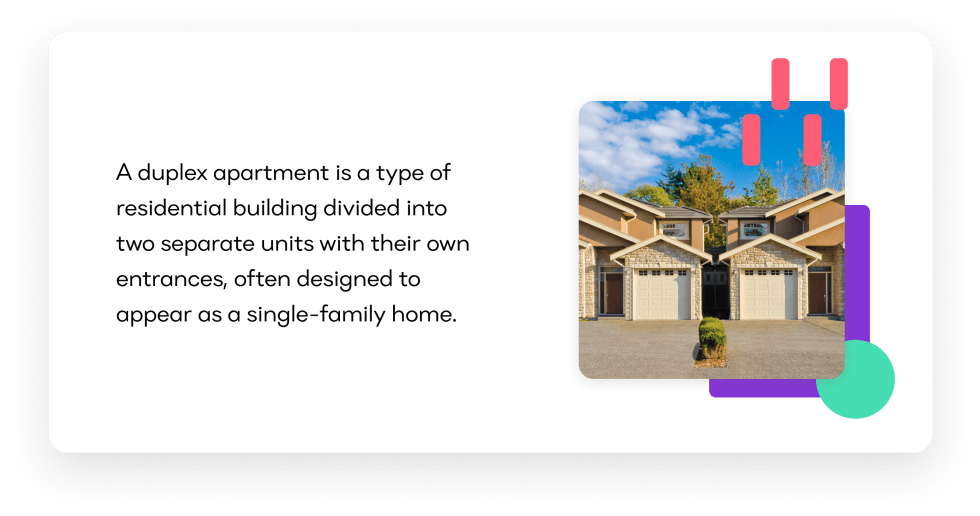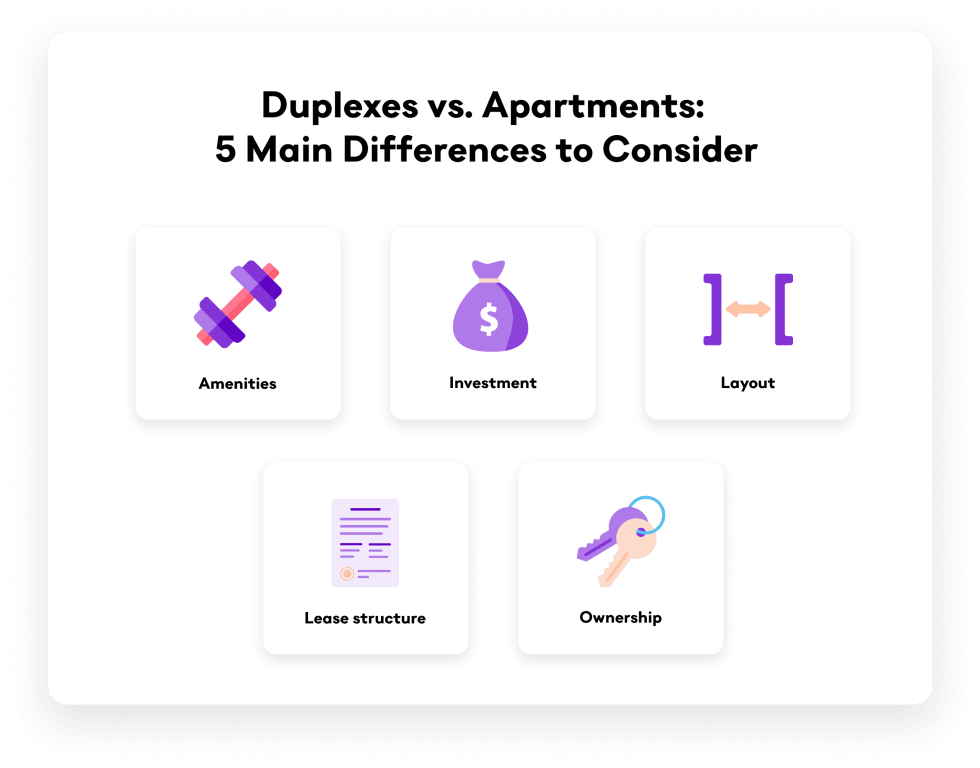Preston Centre
- 43 units available
- 1 bed • 2 bed • 3 bed
- Amenities
In unit laundry, Hardwood floors, Dishwasher, 24hr maintenance, Stainless steel, Walk in closets + more

A duplex apartment is a rental inside a two-unit house where each unit has its own entrance but shares a wall, floor, or ceiling with the other. Duplexes offer more privacy than a standard apartment and are often more affordable than renting a full single-family home.
This guide explains what makes duplexes unique, how they differ from apartments, and whether renting one is right for you.
A duplex is a two-family home divided into separate units on the same lot. The apartment layout for your typical duplex unit consists of:
Because duplexes are typically owned by and rented by the owner, one unit is often rented while the owner lives in the other. This setup can reduce costs for both landlord and renter.

Duplexes and apartments share similarities, but there are a few important differences renters should know.
| Feature | Duplex | Apartment Building |
|---|---|---|
| Ownership | Usually a private owner/landlord | Often managed by a property company |
| Number of Units | Two units on one lot | Dozens or hundreds of units |
| Privacy | More like a single-family home | Shared hallways and common areas |
| Amenities | Yard, garage, or porch (varies by property) | Gyms, pools, laundry rooms, community perks |
| Lease Terms | Flexible; may include yard upkeep rules | Standard leases with property management |
Quick takeaway: Choose a duplex if you want more space and privacy. Choose an apartment if you prefer managed amenities and less responsibility.

Duplexes aren’t the only type of small multi-unit housing. If you’re browsing rentals, you may also see terms like triplex or quadplex. These layouts follow the same idea as a duplex—separate units in one building but with more neighbors and shared walls. Here’s how they compare:
These offer similar perks as duplexes but with more neighbors and shared walls—making them feel closer to traditional apartment living.
Renting a duplex works much like renting an apartment, but with a few differences.
Begin looking for a duplex 1–2 months before your move. Winter may offer lower rents, while summer has more options.
Due to the seasonality in the rental industry, looking for an apartment in the winter months will likely result in a smoother move, as there is typically less competition and lower rent rates.
Use apartment search platforms (like Apartment List) to filter for duplexes by location, pet-friendly options, and lease terms.
Whether you’re looking for pet-friendly apartments or a month-to-month lease, simply select a filter to find a curated list of apartments that fit that criteria.
While touring potential duplex apartments, check for the unit condition, parking setup, and ask key questions:
It’s important to tailor your list of questions to your rental situation. If you need some more inspiration, check out our guide: 20 Questions to Ask Your Landlord When Renting an Apartment.
Be wary of rental fraud during your apartment tour. If your landlord or property manager asks for money during the tour, or you notice any other sketchy behavior, don’t hand anything over.
Once you’ve found a duplex apartment that’s a good match, you can move on to the apartment application process.
Be prepared with:
Once you’ve read and re-read the lease agreement and discussed its terms with your landlord or property manager, you can sign and make the agreement official.
In New York City, the term “duplex” often means a two-story apartment within one unit, not two separate homes. These may be connected by an internal staircase or elevator.
If you’re renting in NYC, confirm whether you’re getting:
This could include sharing a kitchen or kitchenette, as well as living space.
Research the floorplan of the location you’re interested in. Also, be sure you’re comfortable living with your co-renter, and ask plenty of questions before moving in.
There are many benefits of living in a duplex, which is why they’re becoming increasingly popular. This is especially true for renters in New York. Below are the perks of renting a duplex:
Renting a duplex tends to come at a lower cost than a traditional apartment. The additional savings could be just what you need to afford a more desirable location. Since the cost of a single lot is shared between two units, the cost of rent and living expenses tend to be lower. This means that you can find a more attractive neighborhood to live in at a cheaper cost.
Building upon affordable living, duplexes allow for shared costs between you and your neighbor. These costs can include things like yard work, living area maintenance, garage clean-up, or any renovations on shared spaces. Splitting costs for these expenses could save you tons of money.
If you’re looking for a place to share with a close friend or family member, renting out a duplex can be the perfect option. Because walls separate each living space, you’ll still have your own home and privacy. Additionally, since you’ll be right next door, or above or below another, both neighbors will be in close proximity to each other. However, this will only be a pro for a select few. Many will see this type of living situation as a negative.
Compared to other forms of apartments like studios and efficiency apartments, the popularity of duplex apartments is growing. This is especially true in big cities with vast rental markets.
While living in a duplex can be positive and helpful for some people, this type of living can pose difficulties. Here are some of the negative aspects of living in a duplex to consider.
Depending on who your neighbor is, you may have to deal with setting privacy boundaries in a duplex. This is especially true if renting in New York City. As mentioned above, a duplex you find in Manhattan is two stacked living areas with shared amenities that can be accessed through stairs or an elevator. This means you have to trust your neighbor or set boundaries to avoid any negative situations from happening.
If renting a traditional duplex, this could still be an issue as noises and smells that come from sharing a wall may be apparent. This type of rental property with a bad neighbor could lead to plenty of negative experiences.
Continuing with the above concern, you may have shared spaces that you and your neighbor would use cooperatively. These could include, but are not limited to, a back or front yard, or a garage. In those NYC duplexes, this can include a common living space. Always ask your prospective landlord who your neighbor will be ahead of time. Your landlord may be your neighbor in the duplex, which could be an uncomfortable situation.
Compared to apartment buildings, duplexes tend to be privately owned. Therefore, your landlord won’t traditionally hire anybody to complete household tasks like they would in an apartment building. This means you may have to do things like snow shoveling, gardening, and porch or entryway sweeping. These are responsibilities that a renter in an apartment building typically doesn't have.
If you’re considering purchasing a duplex to live in or rent out, it can be a smart investment for numerous reasons:
Interested in learning more about duplexes as investments? Here's a great real-world example of planning a duplex investment from Coach Carson:
https://www.youtube.com/watch?v=PPtMXQbPaFU
Example: A duplex near a university can generate steady rental income while providing affordable housing for the owner.
Duplexes are best for renters looking for an affordable, spacious unit within a residential neighborhood. Keep in mind that you’ll be sharing some spaces with your neighbor, including outdoor areas and hallways. Otherwise, your traditional duplex is a private abode — all your own.
As duplexes are owned by private individuals and usually managed by owners acting as landlords, duplexes may also be a good fit for renters with low credit scores or no credit. Private landlords are more likely to consider your ability to pay rent over your credit score.
If you prefer more established rental procedures and prioritized maintenance, it may be best to stick to traditional apartment communities and complexes. Although private landlords do their best, it’s hard to match the efficiency and reliability of an apartment complex with an on-site apartment manager and maintenance staff.
Looking to kickstart your apartment search? Start apartment searching on Apartment List!
Yes, if you value privacy, space, and lower costs. Apartments may be better if you want amenities or professional property management.
Duplexes are not necessarily harder to sell than other property types, but they do require more maintenance and upkeep, especially if you rent them out. So they may be harder to prepare for sale than a traditional single-family home.
A duplex, like an apartment, can have any number of bedrooms. Though because they tend to be smaller units, they are unlikely to have as many as a large home. Three would be considered a lot of bedrooms for a duplex.
People who prefer the experience of a single-family home tend to like duplexes more than apartments. It often allows them to enjoy the same amenities as a rental house but at either a better price point, or in a better location at a moderate price.




In unit laundry, Hardwood floors, Dishwasher, 24hr maintenance, Stainless steel, Walk in closets + more
In unit laundry, Patio / balcony, Granite counters, Pet friendly, Stainless steel, Walk in closets + more